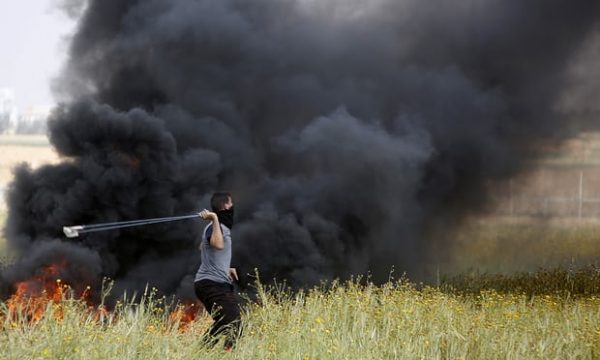
Lebanon, Iran and other nations may now be drawn into a spiral of conflict
Samour’s death was a grim augury of what was to come. As Palestinians observed a day of mourning on Saturday, both sides warned of possible escalation in the weeks ahead. But a bigger question is exercising regional analysts. Will this violent yet long-predicted rekindling of the Israel-Palestine conflict trigger a wider crisis drawing in Lebanon, Syria and Iran?
The absence of a credible peace process underlies the latest confrontation, as happened in 2000 when the second intifada began, and again in 2014. Once again, Hamas and its supporters in Gaza, blockaded by Israel and Egypt and at odds with their Fatah rivals in the West Bank, are using mass civilian protest to end their isolation. Once again, Israel’s rightwing leaders, unwilling or unable to contemplate a two-state solution, compound myopic intransigence with a disproportionate use of force.
The dangerous difference now is timing and context. Friday was the start of six weeks of protests leading up to the 70th anniversary of Nakba day on 15 May, literally the “catastrophe”, as Arabs see it, that followed Israel’s declaration of independence on 14 May, 1948. The US will also move its embassy to Jerusalem in May, effectively recognising the city as Israel’s sovereign capital while ignoring Palestine’s claims. In short, a spring season of looming flashpoints is now begun.
Historical precedents also suggest local confrontations produce negative, region-wide reactions. The biggest worry is Lebanon, where Hezbollah, Israel’s sworn foe and Iran’s close ally, is the dominant political and military force. Strains are already apparent over Israel’s erection of a Gaza-style fence on its northern border and over disputed offshore oil and gas fields.
But for Israel’s generals, the main threat is Hezbollah’s modernised stockpile of an estimated 130,000 short-, medium- and long-range missiles and rockets, and its 50,000 fighters, many of them battle-hardened in Syria.
If the Gaza violence continues and spreads, Hezbollah hardliners can be expected to try to intervene. Iran’s leadership has repeatedly warned, in turn, that unlike the last Lebanon war in 2006, it will directly assist Hezbollah in any fight. Israel, it says, will be “eradicated”.
And Benjamin Netanyahu, Israel’s prime minister, has made plain, to Russia’s Vladimir Putin among others, that current efforts by Iran to create a permanent military presence in Syria and Lebanon cross an Israeli red line. Netanyahu recently underscored his stance by shooting down an Iranian drone and launching air raids on Syrian bases used by Iran.
Previous checks and balances are missing. It is no use looking to the UN security council. When it met in “emergency” session on Friday night to discuss Gaza, it could not even agree a joint statement. Saudi Arabia, which once pursued its own peace plan, is firmly (though tacitly) in the pro-Israel, anti-Iran camp. Likewise Egypt, where Sisi obsesses about jihadists, not justice.
Urging the Americans to step in as honest broker is a waste of breath, too. On this subject, Donald Trump has shown himself to be as ignorant as he is partisan.
And here’s another incendiary May date for your diary. On 12 May, Trump is expected to repudiate the Iran nuclear deal – potentially toppling the whole Middle East house of cards.
THE GUARDIAN

Leave a Reply
You must be logged in to post a comment.